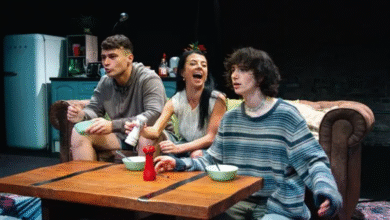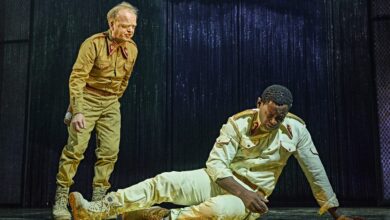A lacklustre and poorly performed take on the classic, moving its setting to the British Raj.summary
Rating
Poor
Shakespeare’s tale of deceit and malice is not an easy one to stage. Even with an interesting re-contextualisation set in the British Raj in 1919, the production at the Union Theatre fails to fully own this mammoth play.
The ‘green-eyed monster’ and the quintessential Machiavellian baddie Iago provide enough juice, drama, and betrayal to make a real meal out of. But to enjoy a meal one needs cutlery (bear with me on this metaphor), and that would be the actors. Sadly it’s the silverware that really lets the production down. Justin William’s & Johnny Rust’s set is a little over ambitious for the small Union Theatre but effectively invokes the Raj. The music/sound, lighting and costume are again rather literal, but they serve the purpose. Setting it in British India is a novel take but it is a rather shallow attempt, throwing vague historical hints about the Amritsar massacre, yet without reading the extensively lengthy blurb I would not have picked up on these. However, the racial tension and military framework of the Raj fits well with the pre-existing script.
The fault can be blamed almost entirely on the acting/directing. Phil Willmott’s blocky staging, overall unimaginative aesthetic sense and lack of focus leaves the actors unsupported in a game they cannot win. The exception to this rule was Rikki Lawton, playing the trickster incarnate Iago – a role filled with spite, resentment, jealousy, and evil machinations. Iago holds a mirror image up to society’s prejudices, talking directly to the audience, exhibiting the worst vices of the day. Lawton does this well, and although slipping into shouty overacting at points provides a solid base for what should be an effective springboard for other actors. Unfortunately, that doesn’t happen. Matthew Wade’s Othello looks the part in full British Indian Army costume, but fails to provide the complexity and hot temper of the eponymous lead. For a man who begins to suspect his innocent wife of adultery very quickly, without the groundwork of his clearly changeable and easily led nature he ends up looking completely insane. Across the board, the level of acting is rather low. Carlotta de Gregori’s Desdemona is lacking in spark, and comes across as one of the most irritatingly insipid female characters of Shakespeare’s output. Maximilian Marston, playing Rodrigo, sucks most of the comic relief out of his part; overall, the production pulls along at a very slow pace.
One reason why companies should be careful restaging Shakespeare is the tricky nature of the language. If effective it can sing, reminding you of the beauty of the English tongue and the universality of the human condition. If not, you are unsure if the actors understand the words they are speaking and the highly dramatic and sometimes slightly ridiculous plots descend into melodramatic chaos. That was the nail in the coffin of Othello. The body count is high in this play, with one character (no spoilers) dying three times; there is alleged self-strangulation, very real torture, and betrayal. This production tries something new but provides an unpolished retelling of the tale we know so well. In the final death scenes, surrounded by bodies and bloodshed, the realisation that you have little or no emotional connection to what is happening on stage begins to creep in.
Author: William Shakespeare
Director & Producer: Phil Willmott
Box office: 020 7261 9876
Booking Link: http://www.uniontheatre.biz/othello.html
Booking until: 6th April 2019







